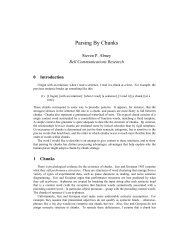The English Noun Phrase in its Sentential Aspect - Vinartus
The English Noun Phrase in its Sentential Aspect - Vinartus
The English Noun Phrase in its Sentential Aspect - Vinartus
You also want an ePaper? Increase the reach of your titles
YUMPU automatically turns print PDFs into web optimized ePapers that Google loves.
4AcknowledgementsIwould like toacknowledge, rst of all, my debttomymany teachers andmentors these last four years: to my thesis advisor, Rich Larson, for hisguidance <strong>in</strong> matters syntactic and semantic, as well as for sound advice <strong>in</strong>the mechanics of thesis-writ<strong>in</strong>g. To the other members of my committee:Noam Chomsky, Ken Hale, and Richie Kayne. To Jim Higg<strong>in</strong>botham, withwhom I have worked closely s<strong>in</strong>ce com<strong>in</strong>g to MIT unfortunately for me, heis <strong>in</strong> Pisa this semester. Thanks also to Jay Keyser, both for guidance <strong>in</strong>l<strong>in</strong>guistics and encouragement <strong>in</strong>my computational <strong>in</strong>terests and to MorrisHalle, for encouragement and direction, and for keep<strong>in</strong>g me aware of thebeauties of phonology.Though none of my work <strong>in</strong> pars<strong>in</strong>g has found <strong>its</strong> way <strong>in</strong>to this thesis,nonetheless a very important partofmy<strong>in</strong>tellectual development asa graduate student has been <strong>in</strong> the area of computation. I am especially<strong>in</strong>debted to Sam Epste<strong>in</strong>, my mentor at Bell Communications Research,for provid<strong>in</strong>g me with a golden opportunity todevelop my ideas <strong>in</strong> pars<strong>in</strong>g,and for his <strong>in</strong>dispensable guidance and encouragement. At MIT, thanks toBob Berwick, for much help and direction to Carl Hewitt, for the opportunitytowork with the Apiary Project to Gul Agha, for endless supportand advice to Jennifer Cole, who I had the good fortune to collaboratewith <strong>in</strong> the summer and fall of 1985, <strong>in</strong> work on pars<strong>in</strong>g to Tom Re<strong>in</strong>hart,my Lispm guru and to Beth Lev<strong>in</strong>, for her guidance dur<strong>in</strong>g the summer Iworked for the Lexicon Project.Iwould like to thank the others with whom I worked at Bellcore: (alphabetically)George Collier, Stu Feldman, Mike Lesk, Maria Slowiaczek, DonWalker. I would also like to thank Don H<strong>in</strong>dle, Mitch Marcus, and RichardSproat, of AT&T Bell Laboratories and Bob Ingria of Bolt, Beranek, &Newman.In psychol<strong>in</strong>guistics, special thanks to Merrill Garrett and Janet Fodor.My studies at MIT were partially funded by a Mellon Graduate Fellowship<strong>in</strong> the Humanities I gratefully acknowledge their support.Among fellow students, present and past, the eight withwhomIhavebeen together s<strong>in</strong>ce 1983 will always be very special to me. I consider myselfvery lucky to have worked together with these people I only wish it weren'tover so soon. <strong>The</strong>y are: Hyon-Sook Choe, Jennifer Cole, John Lumsden,Doug Saddy, Ur Shlonsky, Michele Sigler, Carol Tenny, Loren Trigo. Stillamember of the group <strong>in</strong> spirit|though he left us for warm and sunnyPalo Alto |is Steve Neale. <strong>The</strong>re are also two unocial members of ourclass who have beenvery important to me: Betsy Ritter and Kyoko Masunaga.Among my other colleagues, I would especially like tomention DianaArchangeli (and husband Dante), Mark Baker, Andy Barss, Ed Barton,



